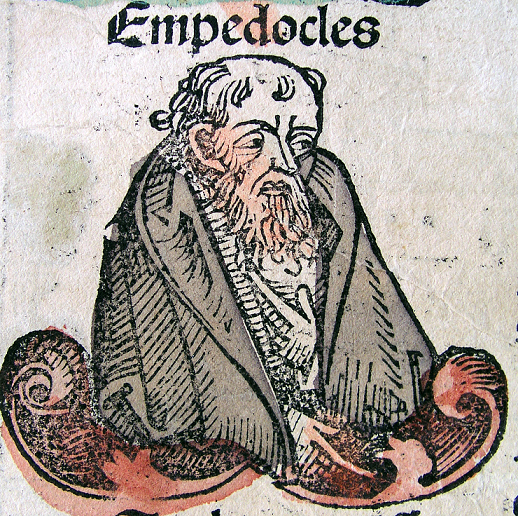Outside & subterranean poems, a mini-anthology in progress (60): Empedocles of Akragas, 'On Nature,' Fragments 1–10

1
Listen, Pausanias,
son of Ankhitos the Sage:
2
Our bodies are tunneled
with myopic sense organs,
stimuli bombard us, pain
blunts the mind’s edge.
We glimpse our momentary share of existence
and with lightning doom
drift up like smoke and disperse
each one believing
only what he’s met in his random encounters
and proudly imagining to have found
the Whole.
Well, it can’t be seen
not in this way
can’t be heard
cannot be grasped by the human mind.
And you, on this retreat, will learn
no more than human thought can attain
3
but shelter it in a silent heart.
4
They’re mad, O gods,
keep their madness from my tongue!
Siphon a pure spring
through my sanctified lips,
And you
white-armed virgin whom many would marry
Muse of all
that is lawful for mortals to hear:
Drive me in your chariot with its delicate reins
as far as is lawful from Piety’s side.
Fame’s deathly blossoms
could never tempt
you, Goddess,
to pluck these flowers
say out of boldness more than what’s right
or enthrone yourself upon Wisdom’s peaks.
And now: Start using every faculty
to see how each thing is clear.
You have sight, but don’t trust it
more than your ears,
nor booming sound
more than the probe of your tongue,
Don’t check any of your body’s means of perception
But take constant notice of the clarity of things.
5
And although inferiors mistrust their masters profoundly
you must attain the knowledge
our Muse attests to and orders
But first
sift these words through the guts of your being.
6
Learn first the four roots of all that is:
ZEUS (a white flickering)
life-breathing HERA
AIDONEUS (unseen)
and NESTIS
whose tears form mortality’s pool
7
uncreated
8
And I will tell you this:
There is no self-nature
in anything mortal
nor any finality
in death’s deconstruction
There is only
the merging, change
and exchange
of things that have merged
and their self-nature is only
a matter of words
9
The elements combine and merge
from human beast bush or bird
emerging into brilliant air
but ‘originate’ is only a word.
And when the elements unsift themselves
we speak of ‘death’ and ‘sad fate’,
language not in accordance with Nature, merely
a convention, but useful as such, and so
10
: Death the avenger
Translation from Greek by Stanley Lombardo
COMMENTARY
from Barbaric Vast & Wild: An Assemblage of Outside & Subterranean Poetry to be published by Black Widow Press in 2014
SOURCE: Stanley Lombardo, Parmenides and Empedocles: The Fragments in Verse Translation, Grey Fox Press, San Francisco, 1979.
“All art should become science and all science art; poetry and philosophy should be made one.” Friedrich Schlegel
(1) If it’s Plato who hawks the ancient quarrel between philosophy & poetry, there’s no doubt either that his great predecessors among the “pre-Socratics” (Parmendies & Empedocles in particular) were themselves poets of note as much as philosophers & protoscientists, or that the “ancient quarrel” & separation simply didn’t hold – not then, not now. And while their works survive only in fragments, culled from citations by others, their power as poets was well known & acclaimed as such within their lifetimes.
Much more than that in fact. Empedocles’ perceptions & visions carry forward what has been fairly described as a shamanic tradition & a linkup on the future end with an emerging philosophical poetry as a natural fusion of both philosophy & poetry. Situated in Sicily for most of his life, Empedocles suffered like others for his political actions – anti-authoritarian & democratic by most accounts – that made him for a time (he wrote) “an exile from the gods and a wanderer.” Writes Stanley Lombardo in the introduction to his workings from Empedocles’s surviving fragments: “Politically active (to the point of exile) in his native city Akragas, he was in touch with the philosophical and religious movements percolating through the larger Greek world and in particular those that emanated from southern Italy, home to Pythagoras and Parmenides and a center of mystic religious activity. He lived during the Golden Age of Pericles, but spiritually he belonged to an earlier generation; and although he never visited Athens, his reputation as a philosopher-shaman was pan-Hellenic.” The legend of his death by leaping into the volcanic crater of Mount Etna only adds to his mystique.
(2) Philosophical poetry, as a distinct & fully developed genre in ancient Greece, has been obscured by the lack of complete texts without which the full range & force of the poetry is lost to us. In the case of Empedocles the score stands at some 150-odd fragments as the remnants of at least two major 3000-line poems, entitled post-facto On Nature and The Purifications. That these fragments, when numbered & arranged as what Robin Blaser & Jack Spicer once spoke of as “serial poems,” carry a great force into the present, is a testament to the power of word & mind to cross the boundaries set by time & language. Says Empedocles, addressing a presumed disciple Pausanius, in an accounting of his powers:
Press these things into
the pit of your stomach
as you meditate with pure
and compassionate mind ….
and they will be with you the rest of your life,
and from them much more, for they grow of themselves
into the essence,
into the core of each person’s being.
But if your appetite is for all those other things
that generate suffering
and blunt human minds
these powers will leave you in the turning of time
and out of love for their own
return to the Source.
For this you must know:
All things have intelligence, and a share of thought.
Poems and poetics